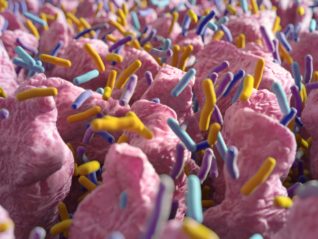
by Noelle Patno, PhD
Colonoscopy is one of the most common medical procedures, used for screening various bowel diseases, including colon cancer, to examine for any pathological findings (e.g. polyps, ulcers, or inflamed tissue). Barriers to colonoscopy include patients’ fears related to invasiveness, pain, or complications.1
Complications may be as minor as bloating or as severe as bowel perforation (rare); factors that may predict increased risk for complication include insufficient bowel preparation (not completely cleaned out and therefore more difficult to visualize the tissue) or incomplete colonoscopy (for example, not completely scoped due to not fully cleaned intestine or tumor obstruction).2
In reality, the incidence of minor adverse events is quite low, typically occurring within the first two days after the colonoscopy and uncommon after two weeks.3 Most people go to work the day after the colonoscopy, but in some cases, feeling sleepy, weak, or significantly bloated and in abdominal pain may cause people to miss work.4 While the majority of studies related to colonoscopy evaluate new technologies to improve bowel preparation5-7 and pain during the procedure,8,9 less research focuses on the majority of minor symptoms occurring post-procedure. One of these pain-reducing techniques is carbon dioxide insufflation, (not available at all sites for colonoscopy procedures) which can reduce pain during and after colonoscopy.8-9 Experiences after colonoscopy render it less likely for patients to return for future endoscopies if they are needed,10 so more techniques to improve the post-colonoscopy experience are warranted.
Since the gut microbiota is severely disrupted if not obliterated during bowel cleansing (and this dysbiosis contributes to symptoms of bloating and pain), probiotics may be a potential option to improve gastrointestinal (GI) symptoms post-colonoscopy. Recently, a combination of probiotic strains consumed post-colonoscopy was evaluated for the endpoints of bloating, abdominal pain, and altered bowel function.11
Study characteristics include:11
- Randomized, double-blind, placebo-controlled trial
- Prince of Wales Private Hospital in New South Wales, Australia
- 320 patients; average age ~60-61 years
- Colonoscopy preparation: sodium picosulfate
- Procedure: air insufflation (carbon dioxide was not available), took an average of 19.5 minutes. There were no significant differences in sedations used, procedures, biopsies, previous surgeries, time from bowel preparation, or procedural time.
- Probiotic supplementation (1 capsule) the night of colonoscopy and each day afterward for 14 days:
- n=133 received 25 billion colony-forming units (CFUs) of 2 probiotics strains: Lactobacillus acidophilus NCFM and Bifidobacterium animalis subsp. lactis Bi-07 (with microcrystalline cellulose)
- n=126 received placebo (microcrystalline cellulose)
- Patients assessed their pain using a visual analog score, a continuous line, with a 10-point scale at the following time points: 1 hour and 1, 2, 4, 7, and 14 days post-colonoscopy
Major findings include:11
1) Pain reduction by ~19 hours for those consuming the NCFM + Bi-07 probiotic. Specifically, the number of pain days post-colonoscopy decreased from 2.78 to 1.99 (p=0.032).
2) Subgroup analyses demonstrated that patients with pre-existing abdominal pain receiving the probiotic intervention experienced fewer pain days (2.16 vs. 4.08, p=0.0498)
3) There were non-significant decreases in bloating (2.52 vs. 2 days, p=0.111) and time to return to normal bowel habits (3.42 to 3.05, p=0.280).
The authors propose that the dual-strain probiotic supplement may have facilitated improvements via several possible mechanisms: inhibiting pathogens from binding, modulating the immune system, and improving colonic motility and transit, as well as affect the sensitivity of the intestines.11 Lactobacillus acidophilus NCFM12 and Bifidobacterium lactis Bi-07 have been isolated from human sources and have been extensively studied in preclinical and clinical studies and widely used, particularly together in RCTs demonstrating immune benefits in children13 and adults.14 NCFM and Bi-07 have been shown to aid in pain relief from bloating in a double-blind, placebo-controlled trial in patients with functional bowel disorder15 as well as in case reports of irritable bowel syndrome.16
The D’Souza et al. publication described above demonstrates another application for the NCFM and Bi-07 probiotic strain combination, beyond its immune and GI benefits, for the specific attenuation of pain post-colonoscopy.11
Citations
- Trevisani L et al. Colonoscopy, pain and fears: is it an indissoluble trinomial? World J Gastrointest Endosc. 2014;6(6):227-233.
- Chan AOO et al. Predictive factors for colonoscopy complications. Hong Kong Med J. 2015;21(1):23-29.
- Azalgara VM et al. Rates of minor adverse events and health resource utilization postcolonoscopy. Can J Gastroenterol Hepatol. 2014;28(11):595-599.
- Newcomer MK et al. Unplanned work absence following outpatient colonoscopy. J Clin Gastroenterol. 1999;29(1):76.
- Parra-Blanco A et al. Achieving the best bowel preparation for colonoscopy. World J Gastroenterol. 2014;20(47):17709-17726.
- Kherad O et al. Polyethylene glycol versus sodium picosulfate bowel preparation in the setting of a colorectal cancer screening program. Can J Gastroenterol Hepatol. 2015;29(7):384-390.
- Pinfield A et al. Randomised trial of two pharmacological methods of bowel preparation for day case colonoscopy. Arch Dis Child. 1999;80(2):181-183.
- Kim HG. Painless colonoscopy: available techniques and instruments. Clin Endosc. 2016;49(5):444-448.
- Chen S-W et al. Carbon dioxide insufflation during colonoscopy can significantly decrease post-interventional abdominal discomfort in deeply sedated patients: a prospective, randomized, double-blinded, controlled trial. J Gastroenterol Hepatol. 2016;31(4):808-813.
- Bini EJ et al. Systematic evaluation of complications related to endoscopy in a training setting: a prospective 30-day outcomes study. Gastrointest Endosc. 2003;57(1):8-16.
- D’Souza B et al. Randomized controlled trial of probiotics after colonoscopy. ANZ J Surg. 2017;87(9):E65-E69.
- Sanders ME et al. Invited review: the scientific basis of Lactobacillus acidophilus NCFM functionality as a probiotic. J Dairy Sci. 2001;84(2):319–331.
- Leyer GJ et al. Probiotic effects on cold and influenza-like symptom incidence and duration in children. Pediatrics. 2009; 124(2):e172-e179.
- West et al. Probiotic supplementation for respiratory and gastrointestinal illness symptoms in healthy physically active individuals. Clin Nutr.2014;33(4):581-7.
- Ringel-Kulka T et al. Probiotic bacteria Lactobacillus acidophilus NCFM and Bifidobacterium lactis Bi-07 versus placebo for the symptoms of bloating in patients with functional bowel disorders: a double-blind study. J Clin Gastroenterol. 2011;45(6):518-525.
- Faber S et al. The use of probiotics in the treatment of irritable bowel syndrome: two case reports. Altern Ther. 2005;11(4):60-62.
Noelle Patno, PhD received her PhD in Molecular Metabolism and Nutrition and Masters in Translational Science from the University of Chicago, studying the role of microbial components in intestinal epithelial cell survival related to inflammatory bowel disease. Prior to her graduate studies, Dr. Patno received a chemical engineering degree from Stanford University and worked as an engineer. She has personal experience and interest in preventive nutrition and nutritional therapies for chronic disease, and her current role involves researching and developing probiotics, prebiotics, and other nutritional programs for the promotion of digestive and overall health.




